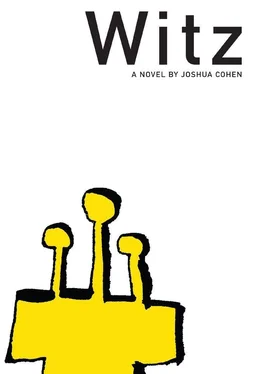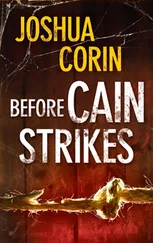Batya, still the lastborn though soon, soon enough, to be usurped in that position, standing awkwardly intoed, flexkneed, pudgy, and whiningly shy with her head held down to rest on a shoulder, her hands holding each other, behind her, her hands in her hands, or maybe they’re just stuck together, they’re bound — her hands are always shvitzing, they’re sticky, like stuffedup spinnerets with the webbing, the silkgum, all tangled. She’s tight in a onepiece pajama outfitted with feet, which zippers down her front as if a metallic mark for incision, her gutting — the spill of her feelings.
Her little rodent eyes say she’s left out of preparations, how that makes her feel: excluded and Hanna, never not a mother, notices, hands her a glass to put away on her own. Batya makes it three, four steps, drops, eternity, floor and the glass shatters into they’re millions of shards, not enough hands to finger them falling: a tint to drink, a prism to sweep, under the baseboard, the pantry, the refrigerator, the islands topped in formica, shored in with grout; under the profane weekday table, under the oven the stove, the dishwasher, hard by the trash’s full bag waiting to be taken outside — flung, the glass throws the light, the outside’s last light streamed in and, too, the overhead light, all over the kitchen, glistening upon the tile, which once was white, illuminating shades she’s never previously known.
Her mother goes not forgetting today’s towels in hand to the laundryroom, for a broom, for a mop, remembering, too — not only drawers — to shut that door behind her, as Batya trips into hiding, upstairs. In the laundryroom, Hanna tosses the towels to the washingmachine. And then, begins the cycle again, to be made new again — saving the dryer for later.
Hanna sweeps the light into a pile, mops as she yells upstairs, put on your shoes! steadying the dustpan with a slipper, then the bucket coldwatered from the laundryroom’s sink, rooting around under the refridge Israel says then the freezer nextdoor to the fridge for what’s stray; she slices her hand, holds it, opens a drawer, roots for the Rag, holds the Rag to the seethe then walks upstairs to her youngest daughter calling her name, so concerned she leaves the drawer open.
And then, wending her way to her own bedroom from the room Batya shares with a sister, soon to be made that of the newborn — they’re in the process of moving Batya and Josephine out, down the hall. This is called, Acting out. This is called, Pregnant; what’s that the doctor told me again — I’ve been through this before. Despite any comfort, the tickle of a feather the tear of a pillow, the stroke of her hair a whispery word — an upheaval. Weekly, the lingering suspicion: this house is a mess. A certifiable wreck.
Though the upstairs is left in pitch — the air a modest enough gown over her skin — she knows her way, the touch of space off the walls, each give in every bum floorboard, the yield of the blue wall-to-wall. Hanna touches the door-post, the jamb, the mezuzah affixed thereupon, then kisses at the fingertip that touched and the kiss becomes a sigh as her hand’s wiped on the hem of her skirt. Her pregnancy weighs heavily; she feels with both hands at her puff, bruised with bloat, her filled wineskin of incredible ephahs and kavs, drunk with fat it feels, like she’s thirsty, hungry, too, the yen always for — breathing enormously, long and deep gulps of air’s inhouse twin.
In her room in its bathroom connecting, she runs the sink’s tap, splashes her sliced hand underneath.
Remember to shut all the drawers and the doors, to turn off the taps — her instructions.
This she must remember, too: which door is her closet — some lead into nowhere, gape into void, a walkin with no out.
She takes a white maternity dress from the drycleaner’s hanger, more offwhite she thinks as she holds it up to the just repainted wall, and, softly, with a sweep, lays it all out on her side of the bed, huge and lonely as empty — always been her side of the bed though she can’t remember when or if they’d ever decided. She’d slept on this side, it feels, even as a girl with her mother, and then alone in her twin. This side, closest to the sun’s rise and its brightening of the bathroom adjoining.
Come my beloved to greet the bride—
the Sabbath presence let us welcome
their mother in the Master Bedroom would be an attempt at a prayer impossible to translate, which she sings to herself in a language she only half-knows, hums, then mouths without sound, kicks her slippers under the bed to sleep there with their innumerable sisters and shoes, as she sits on the bed to unburden her blouse and then again rises to step from her skirt.
Her hand she stretches out to the distaff, her palms support the spindle
She still has to make the salad, too, she remembers: artichoke hearts are what she’d forgotten, they’d be on the middle shelf of the fridge. What else, listing mundane. Standing naked in front of the mirror, which is nude itself, motherwide and as tall as all fathers, it’s hard, she thinks, even in this shadow, to feel, what’s the word? resplendent , to even ape resplendence , what’s that; she exhales her belly cheek, tracing the elastic waves made by the panty waistband, those raggedtoothed, scarry wavelets breaking cuts into a flurry of small widening rivers, stretchmark tributaries veined swirly and tidal from her thirteen pregnancies now, is it that many, has it been; cutting a fingernail through the watery grain of her vanity, cedar topped by tile, its dust if you can believe despite Wanda (where’s the nail broken, she looks but can’t find it, not really, forget it, that’s not what I do). Is it still there, though, and if so will it fit? and, then, what is It? all, the marriagebedclothes, the one or two items of clothing she owns for a life lived between the swellings of kinder, the workout apparel she’d bought for that one month fitness jag back a year ago now, the lingerie he’d once bought her, a year or so before their first, so long ago she thinks at the mirror, at herself in the mirror, thinking of resilvering, too; the intrusion on intimacy of practical life, the practicable, dusts: on this great expanse of wood taking up an entire wall — if there’s light enough naturally and not that of those bulbs above kept glareless and silent from hum, upon whose turns she doesn’t want to break her eyes in her forgetting of them over the Sabbath — a few hairbrushes, combs toothsome, tangled up with the week’s losses, mostly grays from her true hair, some six variously styled wigs beneath, shaytels you say, she says sheytels, one for each day and then the Shabbos’ kept under the kerchief of sky, snooded with a tichel, worn tight: straight, wavy, curly corkscrewy, crowned and banged, nipped in the nape, tapered and layered, the Asiatic silky and the synthetics, hitech faux, the Maxi, the Micros and Euros, the Rachel Gold, Leah Plus; these wigs over wigs under wigs she wears, auburning over a chocolate base over her own unadulterated hair, that natural brilliance, all lightening shades of the One True Shade: the naturally lightened if still a little dyed henna of aged dusk, of the olden night dawning in strands, to pluckout if too light to gray or white or to tuck behind the ears, the fall of horizon; then, an odd handful of pins: bobbies, safeties, and straights to prick her with the impractibility of it all, the girlishness; what a fool to fumble among the drawers open and quickly shut again upon another nail, finger, slit hand, for her old tiara, a souvenir from an occasion forgotten, a kitschy wedding or barmitzvah, given away as a favor to another’s celebration — she’d saved it for home, plastic and glittery littering why in its own plasticbag in its own bottom drawer. She rises from her knees to the mirror to try the thing on, sits it askew on her head then turns to look vain over a shoulder, profiling its shadow, holds herself steady at the lip of the vanity while feeling shakes from her belly, from the floor’s carpet a rattle and without her slippers or shoes, fingers for a hold the holes for her earrings removed — hears life coming up from the diningroom below, holds a smile.
Читать дальше












